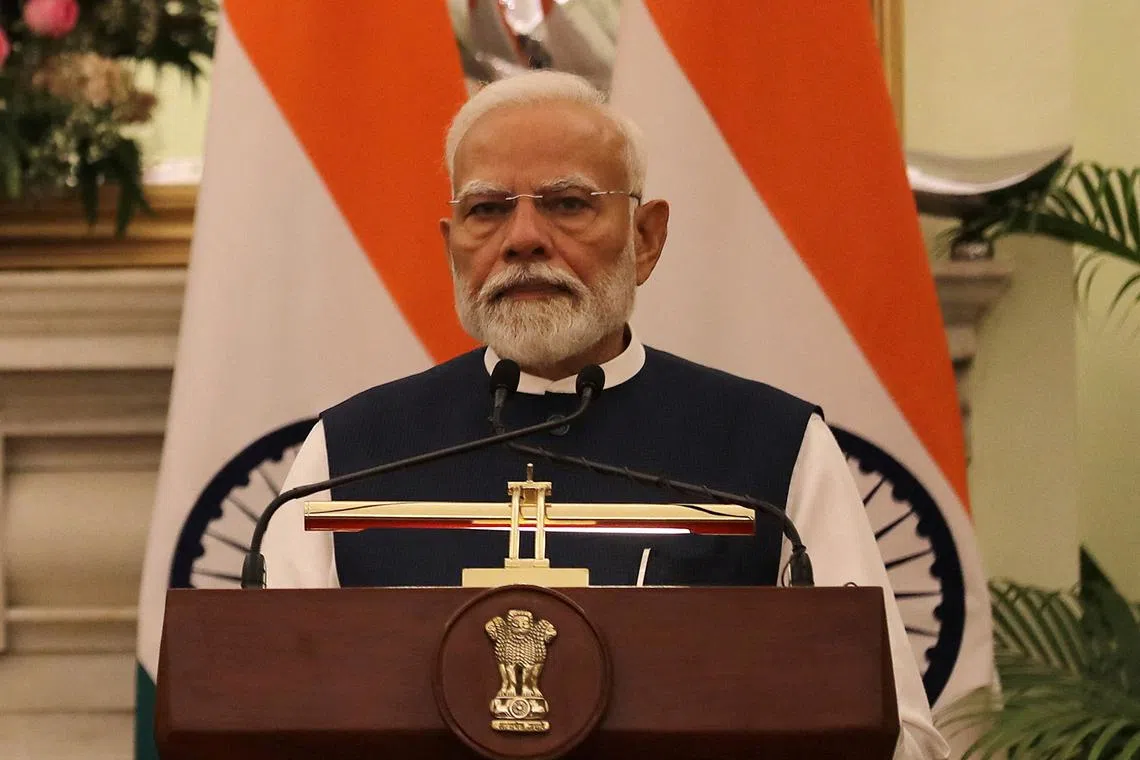India’s Modi vows no compromise on farmers interests amid Trump’s tariff salvo
Sign up now: Get insights on Asia's fast-moving developments

Indian Prime Minister Narendra Modi said he will not compromise the interest of the country's farmers in response to US tariffs on Indian goods.
PHOTO: REUTERS
Follow topic:
NEW DELHI – Indian Prime Minister Narendra Modi said on Aug 7 that he will not compromise the interests of the country’s farmers, even if he has to pay a heavy price for it, in his first comments following US President Donald Trump’s announcement of a 50 per cent tariff on Indian goods.
“For us, our farmers’ welfare is supreme,” Mr Modi said in an event in New Delhi.
“India will never compromise on the well-being of its farmers, dairy (sector) and fishermen. And I know, personally, (that) I will have to pay a heavy price for it,” he added.
Mr Trump announced an additional 25 per cent tariff
The new tariff, effective August 28, is meant to penalise India for continuing to buy Russian oil, Mr Trump has said.
While Mr Modi did not explicitly mention the US or the collapsed trade talks, his comments marked a clear defence of India’s position.
Trade talks between India and the US broke down after five rounds of negotiations over disagreement on opening India’s vast farm and dairy sectors and stopping Russian oil purchases.
India’s Foreign Ministry said the decision was “extremely unfortunate”, and that the country “will take all necessary steps to protect its national interests”.
The US is yet to announce any similar tariff for China
Experts say China’s dominance in rare earth minerals – critical to high-tech industries – gives it leverage that India currently lacks.
“The US tariff hike lacks logic,” Mr Dammu Ravi, secretary of economic relations in India’s Foreign Ministry, told reporters.
“So this is a temporary aberration, a temporary problem that the country will face, but in course of time, we are confident that the world will find solutions.”
India is already signalling it may seek to rebalance its global partnerships.
Mr Modi is preparing for his first visit to China in over seven years, suggesting a potential diplomatic realignment amid growing tensions with Washington.
Brazilian President Luiz Inacio Lula da Silva said on Aug 6 that he would initiate a conversation among the Brics group of developing nations about how to tackle the Trump tariffs.
He said he planned to call Mr Modi and Chinese President Xi Jinping. The Brics group also includes Russia and South Africa.
Mr Ravi added that “like-minded countries will look for cooperation and economic engagement that will be mutually beneficial to all sides”. REUTERS
Modi faces mounting domestic pressure
Both supporters of Mr Modi and the opposition Congress party have called on him to respond firmly to the US tariffs, urging action “with self-respect and dignity.”
“India’s national interest is supreme. Any nation that arbitrarily penalises India for its time-tested policy of strategic autonomy, rooted in the ideology of non-alignment, does not understand the steel frame India is made of,” Congress party president Mallikarjun Kharge said.
Indian industry, already struggling with global headwinds, has expressed alarm.
Mr Sudhir Sekhri, chairman of the Apparel Export Promotion Council, said: “There is no way the industry can absorb such a steep hike”.
He demanded fiscal support from the government.
Indian billionaire Mukesh Ambani’s Reliance Industries in its annual report said continuing geopolitical and tariff-related uncertainties may affect trade flows and demand-supply balance.
India’s equity market, which has been weakening due to tariff risks and muted earnings growth, slipped another 0.5 per cent on Aug 7 to three-month lows.
The reaction was muted as investors bet on the tariffs being negotiated down. REUTERS

